Leggy Arrowhead Plant: How To Keep An Syngonium Bushy
Syngoniums have soft stems and tend to get floppy and fall over as they grow. Here are a few things I’m doing to keep my leggy Arrowhead Plant bushy and full.
My Arrowhead Plant had quickly turned into a floppy Arrowhead shrub in a matter of a few months. I didn’t mind its freeform habit, but it took up too much space. I have 60+ other houseplants, so table and floor space is at a premium in my home.
And this vining plant does grow like crazy. This, combined with the fact that they tend to get leggy, made me devise a plan to keep it more “contained” so it would better fit in the corner it was growing in. I didn’t want to build an addition to house this wild plant!
- Botanical Name: Syngonium podophyllum
- Common Name: Arrowhead Plant, Arrowhead Vine
I did two things to help keep my Arrowhead Plant bushy and prevent it from getting too leggy.
Why An Arrowhead Plant Gets Leggy and Falls Over
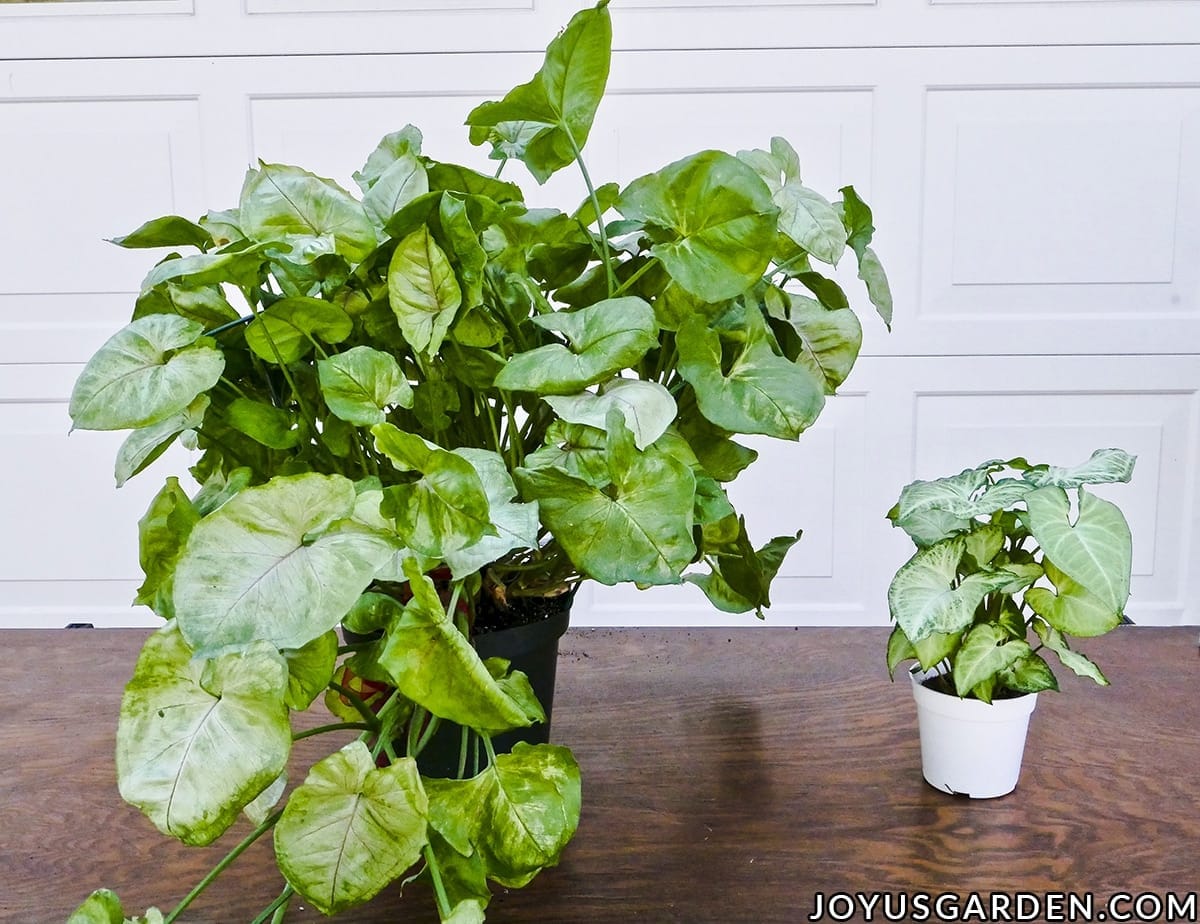
These tropical plants grow up trees and along the ground via aerial roots in their natural habitat. You might have bought yours as a small 4″ plant, and a year or two later, it’s turned into a jungle vine. The longest I’ve seen an Arrowhead growing indoors was about 7′. If the vining habit and look are what you want, then let yours go!
Let me clarify something. Mine wasn’t drooping or flopping from too much or too little water. Arrowhead Plants grow fast; most have a vining nature and soft stems that fall over and flop as they grow.
They like a bright light situation but to be kept out of direct sunlight. Lack of light is another cause for this plant (or any plant) getting leggy.
You can check into some of the new varieties of Syngoniums, which stay more compact and grow slower if trailing isn’t your thing. Another option: check out what I did with my plant in the two videos below.
Are you interested in how to grow this plant? This post on Arrowhead Plant Care will help you out.
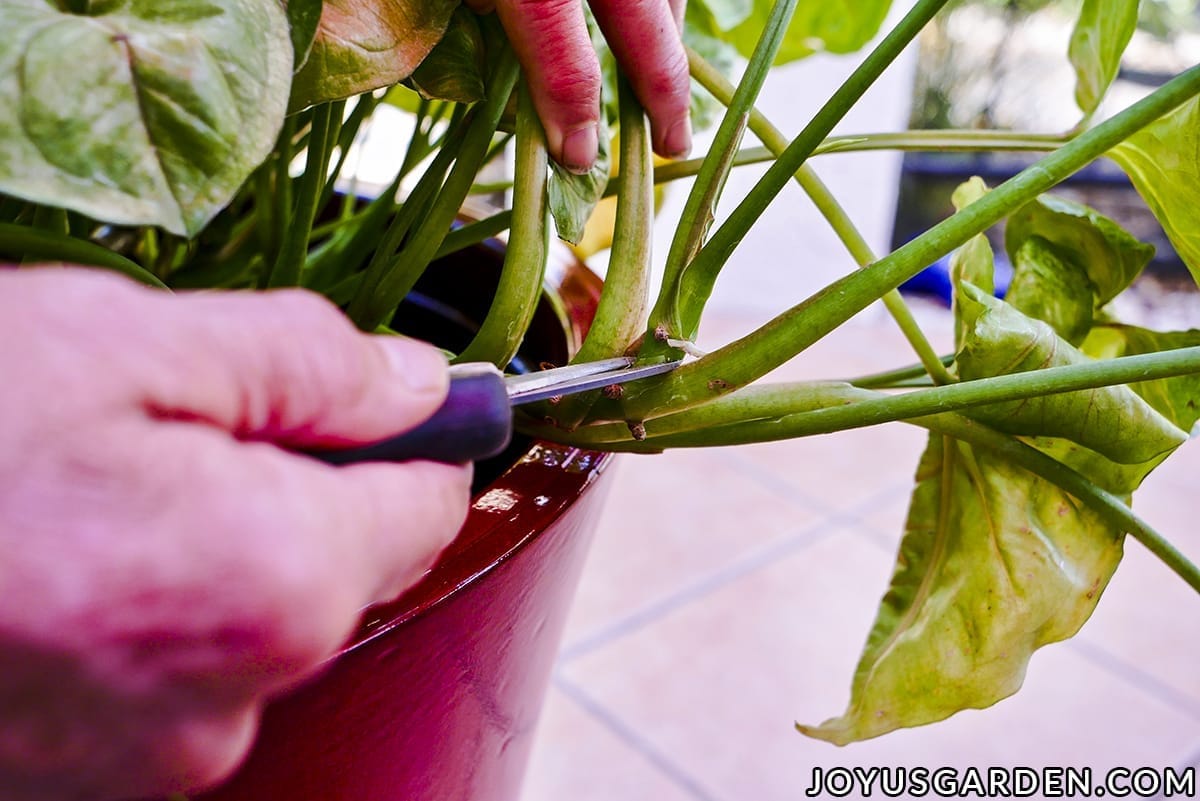
When & How To Prune An Arrowhead Plant
Pruning is a big part of Arrowhead Plant care. It gets rid of the spindly growth and stimulates new growth. For best results, prune yours during the growing season, in spring or summer. Early fall is fine, too, especially if you’re in a more temperate climate.
I pruned the long and leggy stems, taking some of them off completely. You must dive in and start somewhere when the plant is big and floppy. This isn’t artistic pruning, and because these plants grow fast, it’s hard to mess it up.
I then did tip pruning (you can also call it pinching) on the other stems. This is a great way to keep plants from getting too leggy and encourage bushiness. This is where you take 2-5 leaves (plus their stems) off the ends of the main stems.
If you’ve never done tip pruning before, it’s quick and easy to do. You’ll get comfortable with it in no time!
The Arrowhead Plant stem cuttings I propagated from the pruning were 6 – 10″ long. They were ready for planting in a little over three weeks. Yes, their roots grow fast too.
I’ve given this plant aggressive pruning three times now. Regarding the most recent prune job, I cut off several older stems. Those long stems that were bare of foliage at the top really gave the plant an unsightly look.
It’s best to do this one thing before you prune: make sure your Pruning Tools Are Clean & Sharp.
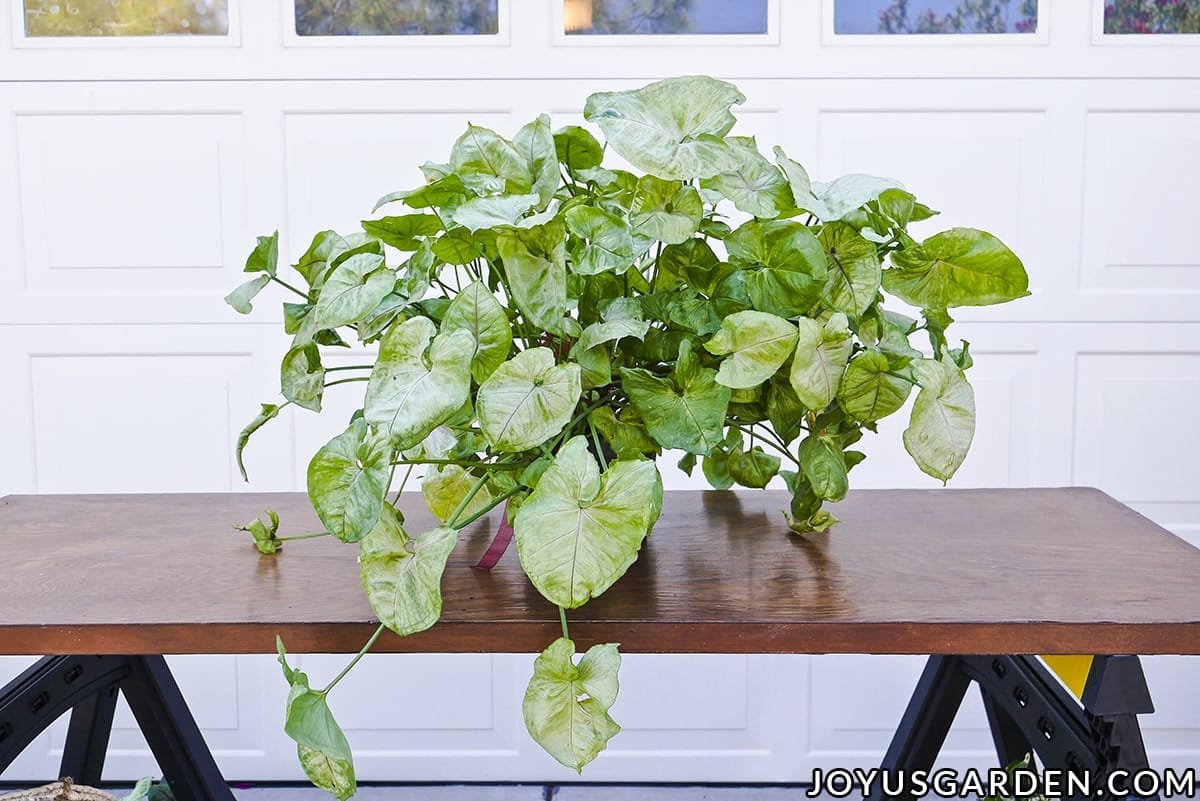
Remove the Yellow Leaves
Before putting the supports in, I cleaned out the weak, yellow lower and inner leaves. This plant grows so densely that the top growth can smother the bottom and inside growth. I hadn’t seen some of them until I put the plant on my work table to film the video, so I removed them after I did the pruning.
How To Support/Stake An Arrowhead Plant
I didn’t want mine to grow upwards on a piece of bark, a small trellis, a moss pole, or a moss stick. Instead, I decided on something I’d used back in the day when I was a professional gardener.
I hoped these 15″ half-round metal garden supports (which I used to hold up delphiniums, dahlias, etc.) would do the trick. And fortunately, they did.
My plant grows in the tall red decorative container (fiberglass and very light, thank goodness) that you see in the lead photo. I marked a couple of stems that I wanted to trail over the front of the container with a red ribbon. I then propped up the back 3/4 of the plant with the two half-round stakes. They fit into the 8″ grow pot just right, so I was pleased as punch about that.
Can You Propagate Syngonium Cuttings?
Oh yes. Those aerial roots make it very easy.
You can propagate them in water or a light potting mix. New roots appear off the stems in no time.
I won’t go into further detail on this here. If interested, check out this post dedicated to Arrowhead Plant Propagation.
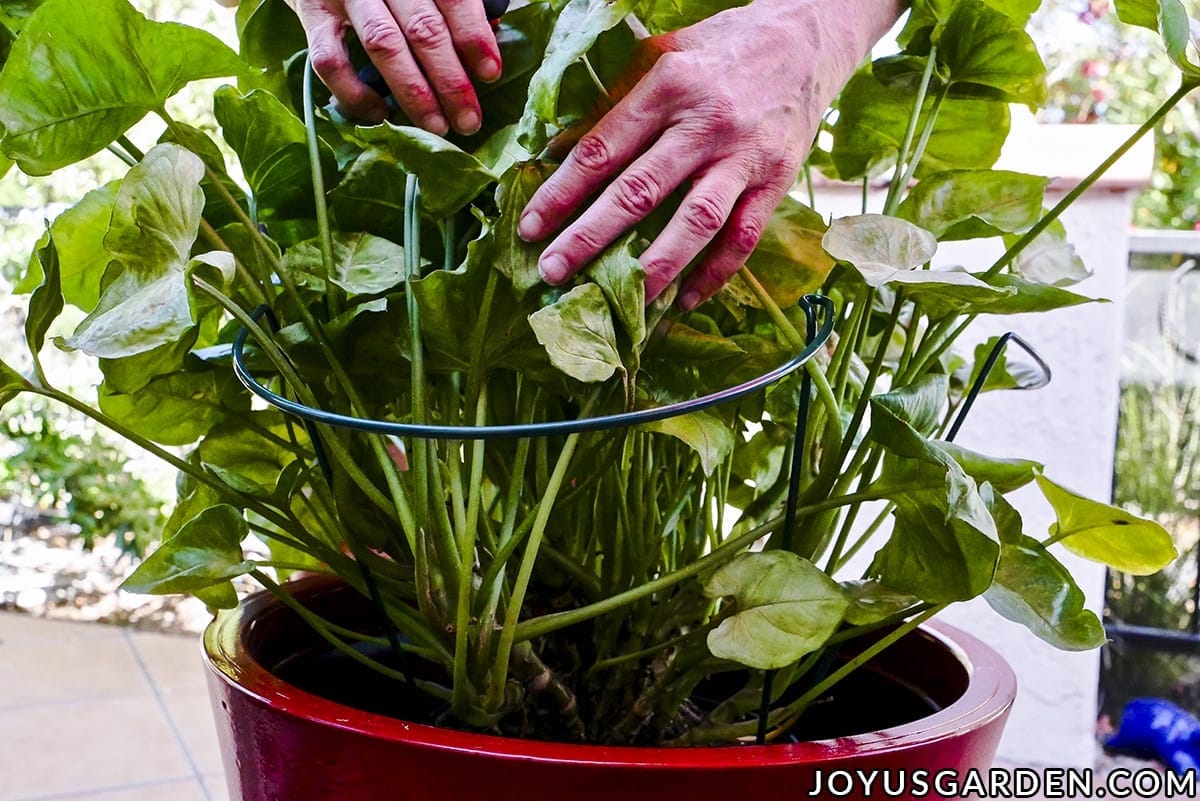
How To Keep An Arrowhead Plant Bushy
I’ll tip-prune the new growth two to three times a year, depending on how my plant grows. I’ll thin out some of those inner stems if it fills in too densely. It shouldn’t need a big pruning for two or three years now.
My Arrowhead Vine fits much better in the corner and doesn’t look like it’s perpetually drooping. I have three other Syngoniums that are different varieties, and they don’t need as much pruning as this one.
Leggy Arrowhead Plant Video Guide 2020
Leggy Arrowhead Plant Video Guide
The same plant three years later.
Arrowhead Plant FAQS
There are a couple of reasons. Young plants stay nice and full. As they grow, some varieties get leggier than others. Another possible cause is not enough light. A plant in low light conditions reaches toward a light source which causes it to get spindly.
You can cut off the leggy stems and tip-prune the remaining stems. Tip pruning is where you cut off the tip of each stem (or selected stems) to keep a plant bushy. It’s a good idea to do regular pruning to keep this plant in check.
And, make sure it’s getting enough light – they like a bright indirect light exposure.
Depending on if the stem grows upwards or downwards, you prune above or below a leaf node.
You sure can, and it’s easy and fast! You can propagate the stems in water or soil mix. You don’t need anything fancy; a jar or glass of water will do. If in soil, use a grow pot and light mix so those new roots can easily emerge and grow.
It depends on what you mean by drooping. It can be caused by too much water or not enough water. My plant was “drooping,” but it needed a good pruning and means of support to keep it from flopping over.
I won’t go into details on that here. I’ve done a care post and video dedicated to Arrowhead Plant Care that you can check out.
Conclusion: Syngoniums are popular indoor plants. Legginess is one of the common problems with this plant, and you can easily fix it with pruning. Following these steps, you can easily maintain your Arrowhead Plant, making it fuller, healthier, and more aesthetically pleasing.
We all want our Arrowhead Plants to stay full, lush, and bushy for years to come!
Happy gardening,


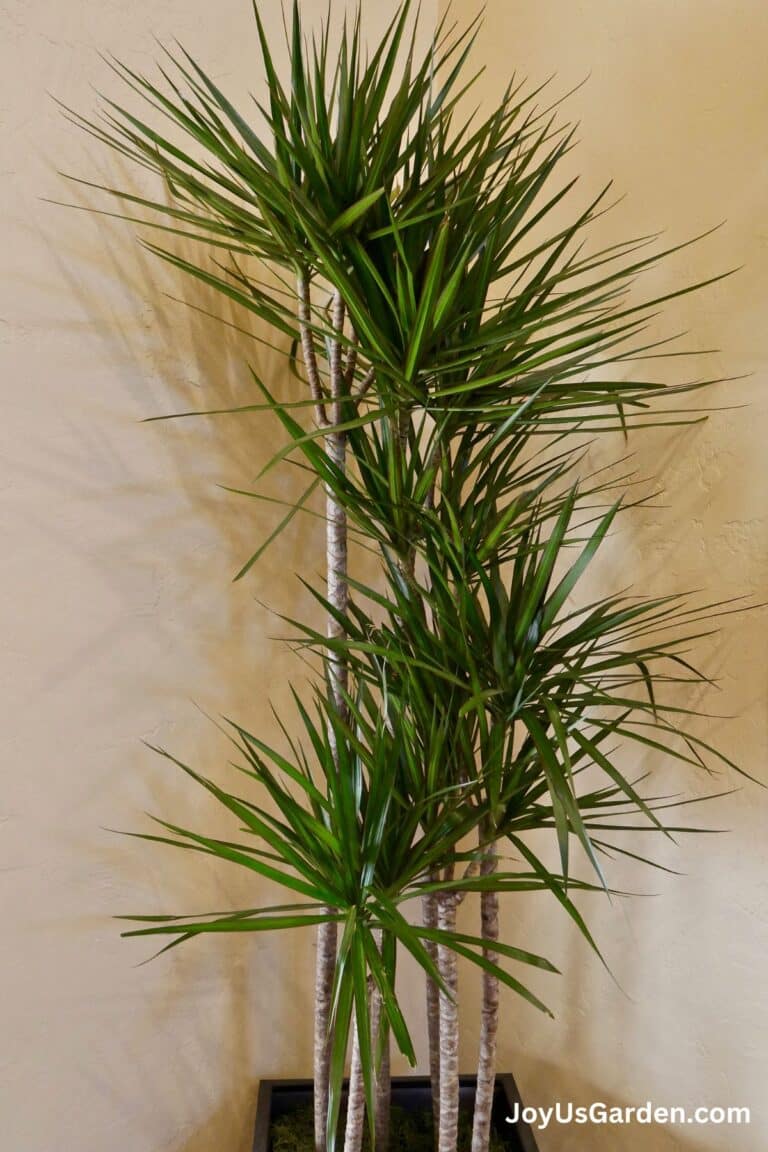

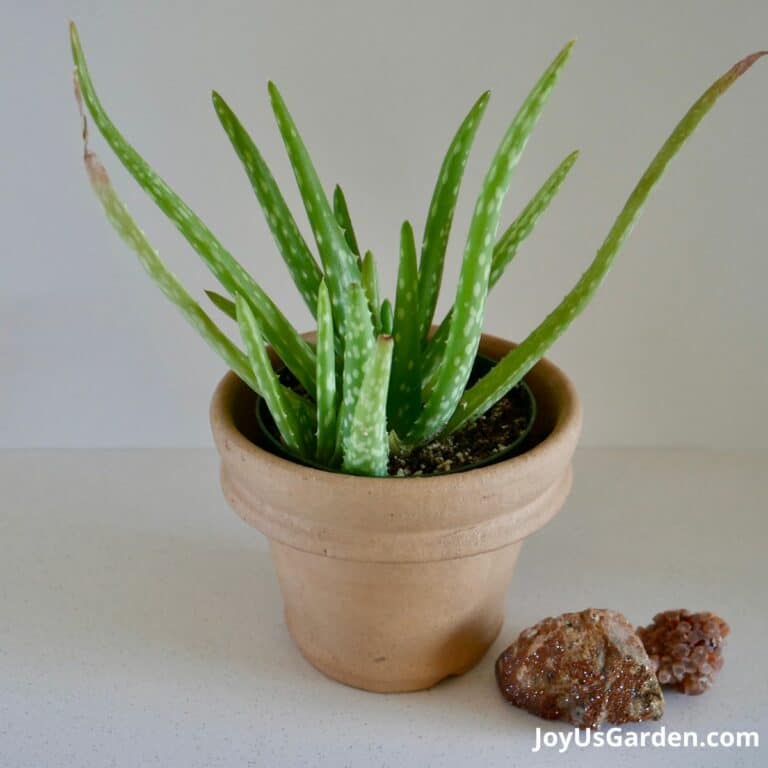
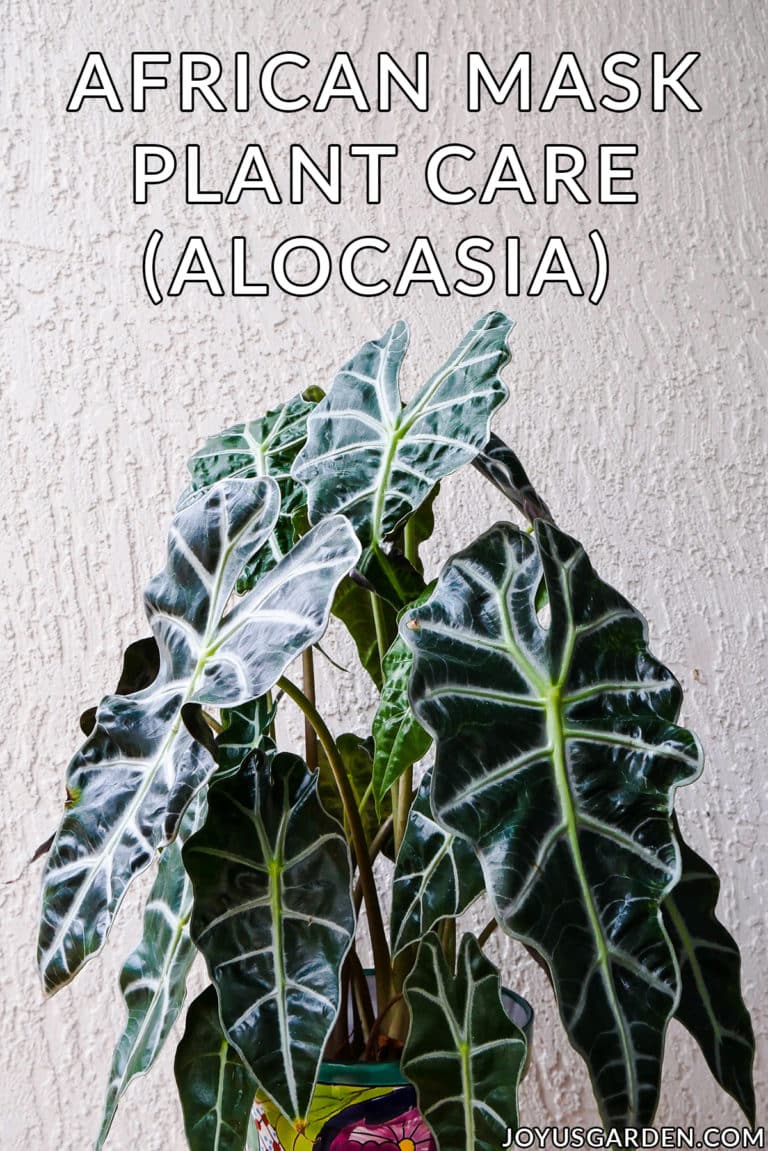
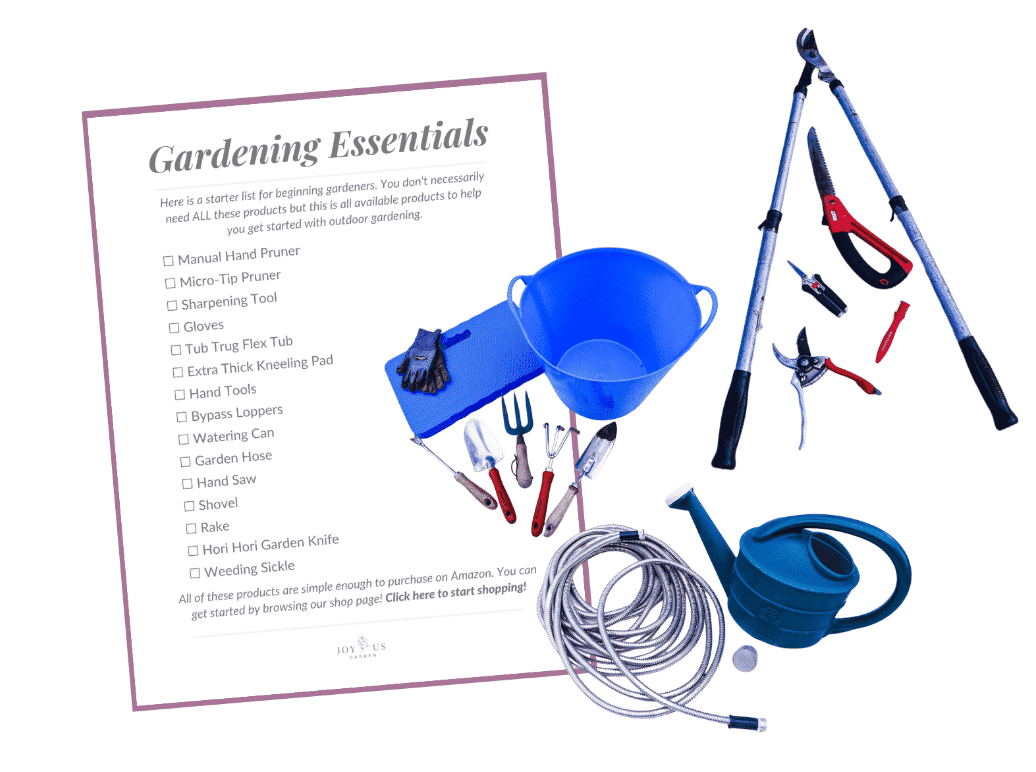
I had bought a hanging 8″ syngonium brocante, which is full as it consists of 3 plants in one pot. There are roots showing on bottom of planter now. Question: If I repot to a 10″ .. I don’t want a Deeper pot for the roots might have Too much dirt thus root rot.. hard to find a good planter. If I separated one of the plants & repotted it, not sure which size? What size pot would I plant the Other 2 together in? Would it be fine in pot it is in since only now 2 plants? Do they like to be pot bound? OR should I transplant all in 8″ but a deeper pot? I don’t know what to do at this time. Help?